- europages
- >
- COMPANIES - SUPPLIERS - SERVICE PROVIDERS
- >
- borosilicate glass
Results for
Borosilicate glass - Import export
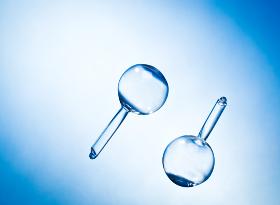
HILGENBERG GMBH
Germany
These special hollow glass beads are made of a borosilicate glass. Their dimensions are very small and move in the lower millimeter range. The ends can be done open as well as closed.
Request for a quote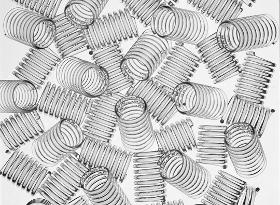
HILGENBERG GMBH
Germany
Thanks to their coiled shape, Wilson helices have an extremely large surface area. Moreover, they are flexible, and therefore relatively insensitive during filling. We manufacture these helices exclusively with borosilicate glass 3.3 in sizes from 2 mm up to 30 mm. Wilson multi turn helices made of borosilicate glass 3.3
Request for a quote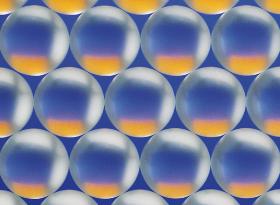
HILGENBERG GMBH
Germany
Our standard glass beads are simple products in sizes from 1 mm upwards, and with a relatively wide range of tolerances. They are usually made of soda glass, borosilicate glass or lead glass, whereby the surfaces can be matt or polished. On request, we can manufacture borosilicate or quartz glass beads with dimensions according to your specifications. Standard glass beads
Request for a quote
HILGENBERG GMBH
Germany
Glass beads are a low-cost alternative for Raschig rings. They have less surface area than the rings, and therefore a reduced separation capacity, but they are perfectly adequate for many applications. Our glass spheres can also be supplied with a matt surface. Various types of glass are possible for our glass beads: Soda glass Borosilicate glass 3.3 Quartz glass On request, we can manufacture borosilicate or quartz glass beads with dimensions according to your specifications. Glass beads
Request for a quote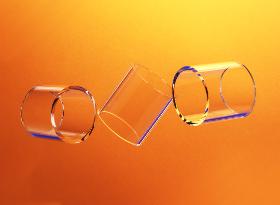
HILGENBERG GMBH
Germany
Our Raschig rings are available in various diameters from 2 mm up to 200 mm. For particularly critical applications, e.g. in reactors, we can chamfer the edges of the rings to prevent chipping when filling the reactor. Various types of glass are possible for our Raschig rings: Soda glass Borosilicate glass 3.3 Quartz glass Neutral glass Raschig rings
Request for a quote
HILGENBERG GMBH
Germany
Our high-precision glass beads are usually made of soda glass or borosilicate glass, but on request we can also supply quartz glass, sapphire glass or optical glasses. The standard tolerance is ± 0,02 mm. Without surcharge, the surfaces can be supplied matt or polished. You need even higher precision? No problem: We can also supply customized glass beads with tolerances of ± 0,01 and ± 0,005 mm. Precision glass beads
Request for a quote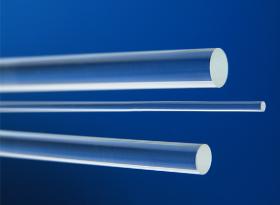
HILGENBERG GMBH
Germany
We provide special rods and fibers, on whose tip a drop of the sample can be filled conveniently into a test tube. Fibers with a diameter of less than 0,1 mm can be inserted even into the smallest test tubes. These rods and fibers are mainly made of borosilicate glass 3.3. We can also supply rods and fibers that are made of the same type of glass as your test tubes.
Request for a quote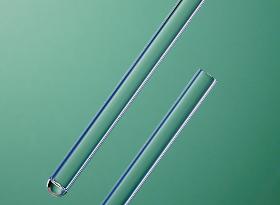
HILGENBERG GMBH
Germany
As a German producer of NMR tubes and NMR consumables such as pipettes and filling needles, Hilgenberg GmbH maintains close contact with the development departments of all major European NMR equipment manufacturers. We have no problems to meet the requirements of the new 100 mm NMR tubes for the Bruker Match™ system, and we are able supply high-quality tubes reliably for a reasonable price. Moreover, we also develop our own products, such as filling needles for the Bruker Match™ system, which have been optimized in close cooperation with external scientific and application experts. Standard NMR tubes of borosilicate glass 3.3 Our standard NMR tubes are manufactured of high-grade borosilicate glass 3.3 with a fine flame burnished rim and a lense-shaped bottom. The standard tolerances correspond to the usual values. If necessary, these tubes can be processed by a glassblower, as the glass used for the tubes can be fused easily with conventional laboratory glass. The tubes are...
Request for a quote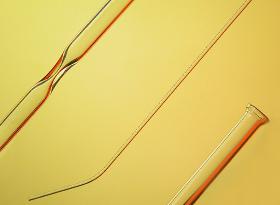
HILGENBERG GMBH
Germany
Do you have a special application for which neither our standard Pasteur pipettes nor the other pipettes offer an acceptable solution? On request we manufacture customized pipettes in a wide range of versions, which are precisely matched to your special application. Shown below is a small selection of the possible versions. Simply contact us for more detailed information – we will be happy to do everything to find a solution. Materials Clear soda glass & gamma-sterilizable clear soda glass Borosilicate glass 3.3 and neutral glass Quartz glass Processing Drawing long and short tips Narrowing the pipette for flow restriction Flanged rims for mounting in holding rings Tips angled at 0...90 ° Sealed tips to protect from dust Packaging Standard packaging Packaging in small quantities Individual packaging OEM packaging with your logo
Request for a quote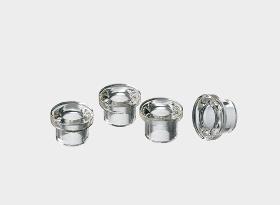
HILGENBERG GMBH
Germany
These short molded components are fused to measurement electrodes and serve as filling/draining ports for the electrodes. The beaded edge is ideal for connecting rubber or plastic hoses. The ports are usually made of lead, borosilicate, and soda glass.
Request for a quote
HILGENBERG GMBH
Germany
We have developed special glass cannulas that greatly simplify filling our test tubes with liquid samples. Our thinnest cannula has a diameter of less than 0,1 mm. This enables even the finest test tubes to be filled without problems. A standard Luer connection enables the cannula to be fitted to conventional one-way syringes or microliter syringes. Our filling needles are made of borosilicate glass, whereby the shaft consists of plastic into which the needle is bonded. Various diameters are available. Syringe needles for filling Mark-tubes with liquids
Request for a quote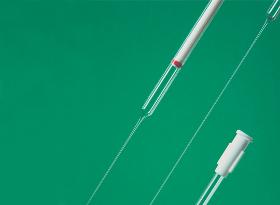
HILGENBERG GMBH
Germany
Filling the very small NMR tubes for the Bruker Match™ system is a particular challenge. Therefore, we have developed two different needles specifically for this task, which greatly simplify the filling procedure. While one needle is intended for use with a standard one-way syringe, the other needle is fitted with an integral plunger. Like our NMR tubes, both needles are made of high-grade borosilicate glass 3.3.As an accessory for the needles with syringe coupling, we also supply one-way syringes with only 0,5 ml volume. Filling needles for the Bruker Match™ system
Request for a quote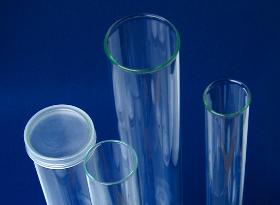
HILGENBERG GMBH
Germany
We produce various tubes and glasses, e.g. for storing samples, tablets, and other sensitive materials that may not come into contact with plastic. The bottom ends of the tubes can be rounded or flat. Available glass types Soda glass (standard) Neutral glass Amber glass Borosilicate glass Standard diameters 17 mm (wall thickness 0,8 mm) 21 mm (wall thickness 0,8 mm) 28 mm (wall thickness 1,0 mm) Customized dimensions on request! Caps and closures Snap-on cap with slightly flanged rim (standard) Rubber stopper, with recessed edge on the tube Ribbed plug, without flange on the tube
Request for a quote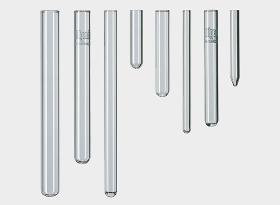
HILGENBERG GMBH
Germany
We manufacture reagent and centrifuge tubes in standard sizes and also with special dimensions and versions from soda glass, borosilicate glass, neutral glass, and quartz glass – optionally with or without flanged rim. All our tubes have a flame burnished rim and can be supplied with a rounded, flat or pointed conical bottom. We are able to process tubes with diameters up to 40 mm, and lengths up to about 500 mm – also thick-walled tubes. Special reagent micro tubes We are able to manufacture reagent micro tubes with rounded bottoms, i.e. with very small dimensions. For example, soda glass tubes with rounded bottom, flame burnished rim, 3 mm diameter, and a length of 20 mm. Test tubes with notch for thermal processes These special test tubes were developed to enable ventilation of the tube’s interior during a thermal process. The notch prevents complete closure and thus an over pressure.
Request for a quote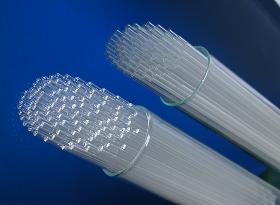
HILGENBERG GMBH
Germany
We offer a wide range of tubes for the automatic or manual determination of the melting or boiling points of liquids and solids. For this, the samples are heated slowly in the test tube until they reach their melting or boiling point. Depending on the application and the temperature range, we use the following types of glass for our melting and boiling point tubes: Soda glass (standard) Borosilicate glass Quartz glass Optional end shapes: open at both ends one end closed both ends closed curved Dimensions: Length 50-300 mm Outer diameter 0,6-2 mm Inner diameter 0,3-1,6 mm U-tubes for determining the melting point Apart from the standard melting point tubes, we also manufacture special U-shaped tubes of soda glass. Hereby, the two legs of the U-tube have different lengths. As an additional option, the U-tubes can be fitted with a small funnel on one or both legs. Melting-& boiling point determination tubes
Request for a quote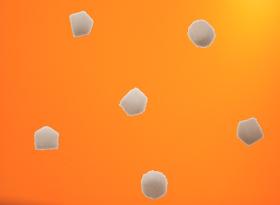
HILGENBERG GMBH
Germany
These small pellets are made of pure, binderless sintered glass, and represent a completely new substrate for use in bioreactors. The open-pored structure of approx. 40...100 µm permits microorganisms to accumulate in the cavities between the sintered glass particles. This ensures that even deeply-embedded cells are supplied with the surrounding medium. Moreover, the material's high purity and its smooth surface provide optimum conditions for high cell growth. Application areas Trickle bed reactors in sewage treatment Substrate for microorganisms and cells in bioreactors Special features Pure sintered borosilicate glass 3.3 Pore size about 40...100 µm Pellet diameter 4 mm Large surface area Optimum flow characteristics High surface charge (Zeta potential) Top-class biocompatibility Enhanced cell growth, because there is no cell agglomeration due to confinement in microcapsules. This REM image shows the open structure and the smooth surface as a result of the sintering process....
Request for a quote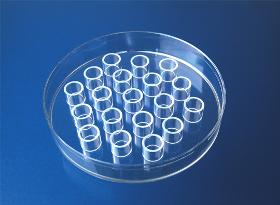
HILGENBERG GMBH
Germany
Cloning cylinders or rings are ideally suited for separate cloning if individual cells or cell groups on a nutrient solution. A specific cell or cell group is separated from the other cells in the nutrient solution by simply placing the cloning ring over it. The rings are made of high-grade borosilicate glass, and can be thermally sterilized without problems. The ring faces are ground perfectly flat, enabling the rings to be fixed e.g. to the floor of a Petri dish by means of a suitable grease. Subsequently, the nutrient solution is filled into the ring. The grease provides a seal between the ring and the Petri dish, whereby the precision-ground flat end ensures that very little grease is required to provide an optimum seal. The same applies in the case of Petri dishes prepared with a nutrient solution – here, the seal is provided simply by pressing the ring into the solution and down to the floor of the dish. Cloning cylinders
Request for a quoteDo you sell or make similar products?
Sign up to europages and have your products listed
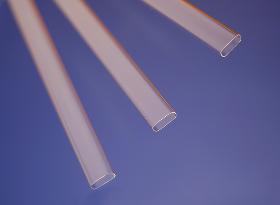
HILGENBERG GMBH
Germany
Our systematic research into new processing methods enables us to improve our production processes and the manufacturing of new products. In this way we are able to realize e.g. extremely thin-walled capillaries with two parallel surfaces. In this process the production of various widths and heights are possible. The innovative manufacturing procedure permits us to produce wall thicknesses of less than 150 μm. Thanks to the minimal wall thickness and parallel sides these capillaries are perfect for high-precision measurements, because the measurement signals are hardly disturbed or absorbed. Therefore, these capillaries are ideally suited for the use as measuring cuvettes and flow cells. Materials Soda-lime glass (AR, I860, PH360 etc.) Borosilicate glass (DURAN©, PYREX©, SIMAX© etc.) Aluminium silicate glass (Schott 8252/8253) Lead glass (lead content up to 28%) Process of Production The capillaries are manufactured by our in-house developed and patented production process. By...
Request for a quote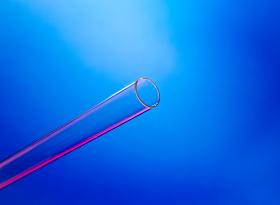
HILGENBERG GMBH
Germany
The distinctiveness of these capillaries is their very thin wall-thickness in relation to their diameter. The extremely thin walls lead to the special feature of these capillaries to be deformed easily. Additional features linked to the thin wall-thickness are minimal optical distortion as well as very low absorption for a wide range of radiation. This feature is used e.g. for the construction of optical measuring cells. Materials Soda-lime glass (AR, I860, PH360 etc.) Gamma sterilized soda-lime glass Borosilicate glass (DURAN©, PYREX©, SIMAX© etc.) Neutral glass (FIOLAX© and DUROBAX©) Aluminum silicate glass (Schott 8252/8253) Quartz glass (naturally melted quartz glass and synthetically produced quartz glass, incl. F300) Lead glass (lead content up to 28%) Sealing glasses for various metals such as: kovar, molybdenum, steel, silver, platinum, palladium Process of Production Like most of our capillaries the ultrathin capillaries are manufactured using the redrawing method....
Request for a quote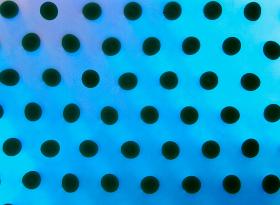
HILGENBERG GMBH
Germany
The cross-sections of multi-channel capillaries consist of a large number of single holes, which are either in a random order or neatly arranged. Depending on the application in which these capillaries are used they can fulfill several tasks. Materials Soda-lime glass (AR, I860, PH360 etc.) Borosilicate glass (DURAN©, PYREX©, SIMAX© etc.) Aluminum silicate glass (Schott 8252/8253) Process of Production Two different production methods are used to manufacture multi-channel capillaries: 1. Production from a preform Prior to drawing the capillary several performs are mounted and joined together. During this process the channels are created from a single capillary. Hollow spaces are then filled with glass rods and are evacuated with heat. All unintended side channels and hollow spaces between the capillaries are sealed during this process and result in a closed cross-section, which is only punctuated with the inner geometry of the single capillaries. Reproducible profile sizes,...
Request for a quote
HILGENBERG GMBH
Germany
Boiling rods Boiling rods are ideally suited to prevent superheating during boiling or distillation in glass beakers or Erlenmeyer flasks. They are made of high-grade soda glass, are reusable, and excellently suited for many applications. Stirring rods Used for mixing and homogenizing mixtures of chemicals and samples. They are also ideal for stirring hot or boiling substances. They are made of high-grade soda glass, are reusable, and excellently suited for many applications. For special applications, they are also available in borosilicate or quartz glass.
Request for a quoteResults for
Borosilicate glass - Import exportNumber of results
22 ProductsCountries
Company type
Category